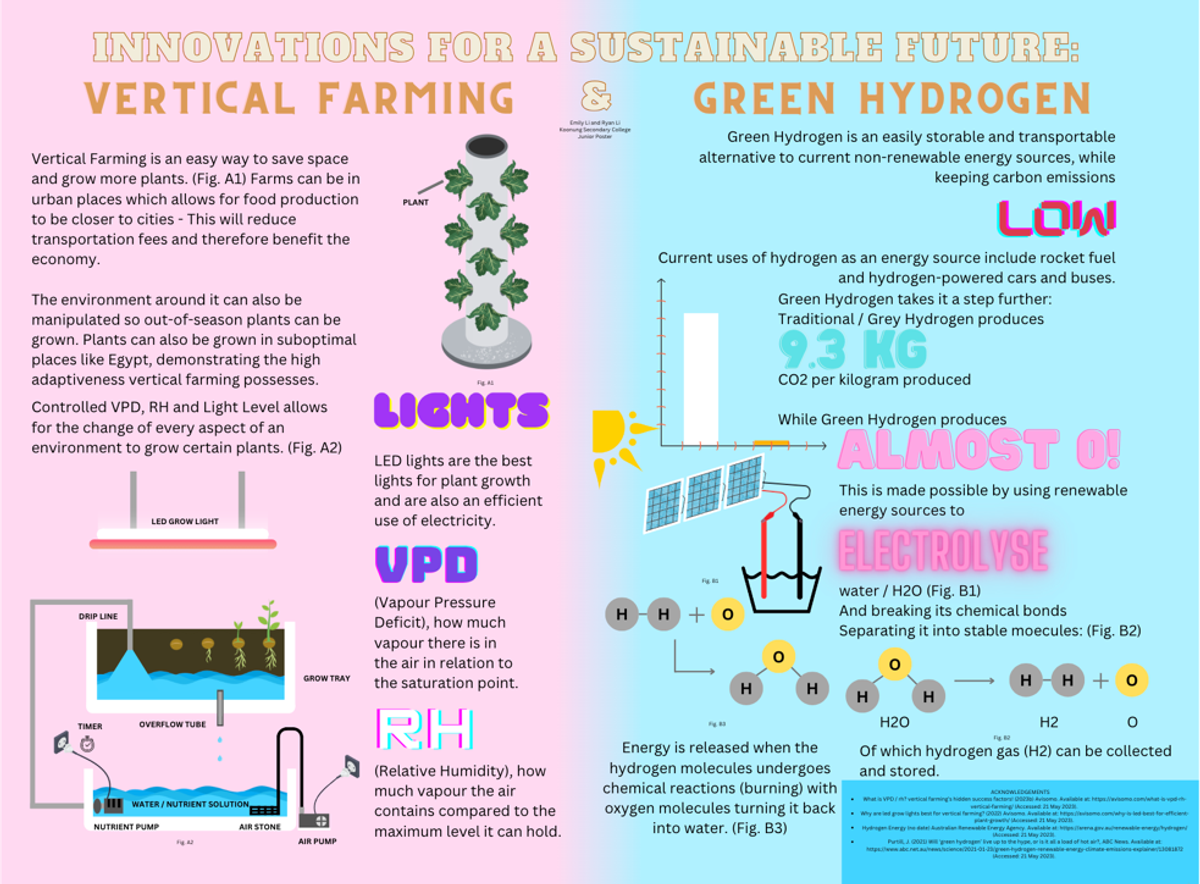Science

Science Talent Search 2023
The Science Talent Search (STS) is an annual, school-based science competition open to all primary and secondary students in Victoria, Australia. We offer this opportunity to our See@K classes and any other interested students who wish to compete. The theme this year was ‘Innovations: Powering Future Industries’, which allowed our students to delve into the depths of AI, technology and beyond. Twelve entries from our school were selected from a pool of brilliant submissions. Our students took time out of their busy weekends to present their submissions to the judging panel. This involves them discussing their idea and answering judges’ questions – a very intimidating, but rewarding process!
Emily Li and Ryan Li from 8D collaborated to achieve a Major Bursary for their poster on Vertical Farming and Green Hydrogen:
We had a further four students earn a Minor Bursary for their entries: Charlotte Chua for her poster on algae plastic, Emily Nash for a video on Sustainable Space, and Megan Yap and Thomas Booth for creative writing pieces.
Distinction places were earned by Izzy Johnstone, Purrie Lim, and Dylan Singh and Vinh Phan for their creative writing pieces, while Ellie Dyason was awarded for her video production on kaleidoscopic eyewear.
Merits were given to Ethan Ng, Ruth Chen and Neve Crouch, and Johann Kim and Zi Kong for creative writing pieces.
Congratulations to all participants for their hard work!
The theme for the competition next year is: ‘Species Survival: More Than Just Sustainability’. If you are interested in participating keep an eye out in term one next year for details.
Please enjoy an award winning entry written by Thomas Booth of 8D
Legacy
It’s Friday the 11th June 2100. “Buzz Buzzzz,” my phone vibrates in my pocket. It’s a call from Mum. “Ashley, where are you? Your phone doesn’t have location on and I’m worried sick.”
“Mum, I’m fine. I just chose to walk home today instead of taking the ...”
But before I can say “bus”, I’m interrupted by the blaring sound of the extreme crisis siren “Wiiiiiiiioooooouuuuuuuuu”. The sound explodes everywhere within the city, yet no one seems to take any notice of it. There’s no frantic rushing, no screaming, just calm citizens living their everyday lives as if the world isn’t ending all around them. Because to be fair, it ended a long, long time ago.
It’s only once we feel the disaster under our feet that we all become frightened. The earthquake here in Melbourne is getting stronger and stronger. The adrenaline rushes through my veins as the city’s inhabitants make a run for it to shelters made especially for this kind of thing.
“Everyone in, NOW!” says the Shelter Chief. We all shove our way in before the door slams shut.
The world wasn’t always like this. When my grandma was my age, in 2034, there were no Tsunamis, no week-long hurricanes or cyclones, no season-long droughts or floods, no regular earthquakes. Occasionally there’d be a roof blown off a house or a few really hot days. And bushfires, of course. There were always bushfires.
Heck, when she was alive the Arctic still existed! Now it’s just more water that causes London to flood. And wow, that global water cycle means the rain sure can fall! Apparently, we get an extra 6.8% rain than when grandma was a kid!
Here in Melbourne the angry ground eventually stops grumbling and shaking, we’re let out of the Shelter. The sight we see gets worse every time we come out. Cars broken and dispersed crazily around the streets. Buildings and houses have cracked and crumbled. Sometimes there are dead people in the rubble too; the ones who weren’t fast enough to get to the shelters.
The politicians say that no one could predict it would be as bad as this and that there was no evidence that could help change the future. But my grandmother told me that wasn’t true.
I think of the crazy old lady down the road who built a special house years before the city shelters were built. People said she was mad. She said we were mad not to build our own. Maybe she was right? My grandmother said she’d heard of the old lady before she moved to our street. Apparently, she devoted her whole life, from childhood, to stopping this from coming true. Her name is Greta, I think.
I do some research and after watching countless interviews and videos of her past life I realise she’s got the answer. She’s always spoken the truth, even when the politicians back in 2020 said she was exaggerating and shouldn’t be listened to.
“We need to strike for action on climate change,” I realise, “we have to fight for it even when those in power try to stop us.”
My generation has never had a chance to live in the kind of world we read about in story books. No gentle autumn breezes or crisp spring mornings for us, just heat, or cold, or torrential rain, or drought. We want a chance to change the world for our grandchildren. Our time starts now.
Early one Saturday morning I get the courage to walk to Greta’s house in hopes of an alliance of sorts. I arrive and am greeted with steel doors and quadruple glazed windows. Her wind turbine turns gently overhead and the geothermal heat pump does its best to fight the cold. I knock and knock, but there’s no response. I turn around to head home when I see her standing there, a fierce old lady with bright eyes and white hair, in all her might and glory.
“I want to help to save the world” I say.
“Welcome to the club,” she replies.
The next few days of starting protests and riots turns into weeks and then months of people-power making real change. We push for the wind and wave turbines to be turned back on, and we strike until fossil fuels are finally banned, 80 years after Greta wanted them to be. Neighbourhoods buy storage batteries and come together to plant trees, hoping to offset the carbon and make the best use of solar power.
Some farmers embrace carbon sequestration and begin to use biochar to plant their crops, while others turn their land over to solar power.
Over the next 20 years, everything from supermarket packaging to lifestyle products undergo a radical transformation. No more wasteful vanity products. No more frivolous trash in dollar shops to become landfill.
It takes time, and effort, and belief, but slowly the idea of using the world’s resources for profit and power is transformed into working with nature to enjoy the earth’s beauty and leave the world a better place.
For the rest of my life, I work to bring about real change. The Arctic may never be quite the same as before, but ice eventually begins to re-form. Temperatures gradually lower by 2.7 degrees over the next 70 years and natural disasters, although common, are less severe and children begin to feel safe to play outside again.
In 2171, as I lay on my deathbed with my loving family all around me, I remember all the things I have done; the lives I may have saved and the ones I could not. As my eyes slowly close, I’m comforted by the thought that my legacy, and Greta’s, will live on.
Education Perfect Science Championship 2023
Education Perfect runs an annual science championship where students can compete from all over the world. They have three days to answer as many science questions as they can from a range of topics across biology, chemistry, physics, environmental science, and psychology.
Koonung Secondary College placed 110th globally from 1409 schools with Derek Liau scoring an amazing 4081 points, awarding him an elite ranking, placing him 55th amongst all participants – the top 1% in the world. This is a fantastic effort and an amazing demonstration of scientific knowledge.
Look out for the 2024 competition on Education Perfect next year if you would like to participate.
Kate Arnold
Science Domain Leader


